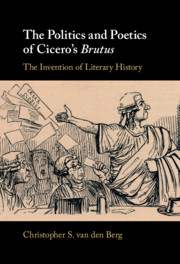Book contents
- The Politics and Poetics of Cicero’s Brutus
- The Politics and Poetics of Cicero’s Brutus
- Copyright page
- Dedication
- Contents
- Preface and Acknowledgments
- A Note on the Text
- Abbreviations
- Introduction
- Chapter 1 Ciceropaideia
- Chapter 2 The Intellectual Genealogy of the Brutus
- Chapter 3 Caesar and the Political Crisis
- Chapter 4 Truthmaking and the Past
- Chapter 5 Beginning (and) Literary History
- Chapter 6 Perfecting Literary History
- Chapter 7 Cicero’s Attici
- Chapter 8 Minerva, Venus, and Cicero’s Judgments on Caesar’s Style
- Conclusion
- References
- General Index
- Index Locorum
Chapter 3 - Caesar and the Political Crisis
- The Politics and Poetics of Cicero’s Brutus
- The Politics and Poetics of Cicero’s Brutus
- Copyright page
- Dedication
- Contents
- Preface and Acknowledgments
- A Note on the Text
- Abbreviations
- Introduction
- Chapter 1 Ciceropaideia
- Chapter 2 The Intellectual Genealogy of the Brutus
- Chapter 3 Caesar and the Political Crisis
- Chapter 4 Truthmaking and the Past
- Chapter 5 Beginning (and) Literary History
- Chapter 6 Perfecting Literary History
- Chapter 7 Cicero’s Attici
- Chapter 8 Minerva, Venus, and Cicero’s Judgments on Caesar’s Style
- Conclusion
- References
- General Index
- Index Locorum
Summary
Chapter 3 examines the Brutus as an intervention in contemporary politics. It begins by revisiting the preface but focuses on its discussion of the contemporary civic crisis and the immediate history of the civil war (1–25). In both the preface and the digression on Julius Caesar (254–57) Cicero presents an alternative civic vision as a response to the crisis. The chapter concludes by considering the portrayal of the younger generation of orators: Curio (filius), Caelius, Publius Crassus, and Marcellus. The last figure merits special attention because Cicero’s oratorical canon includes only two living figures: Marcellus and Caesar. Marcellus is accorded a prominent role as part of Cicero’s attempt to offer a coherent vision of the republic, one based on the restoration of the senatorial elite and the reinstatement of the traditional institutions of government.
- Type
- Chapter
- Information
- The Politics and Poetics of Cicero's BrutusThe Invention of Literary History, pp. 75 - 101Publisher: Cambridge University PressPrint publication year: 2021

